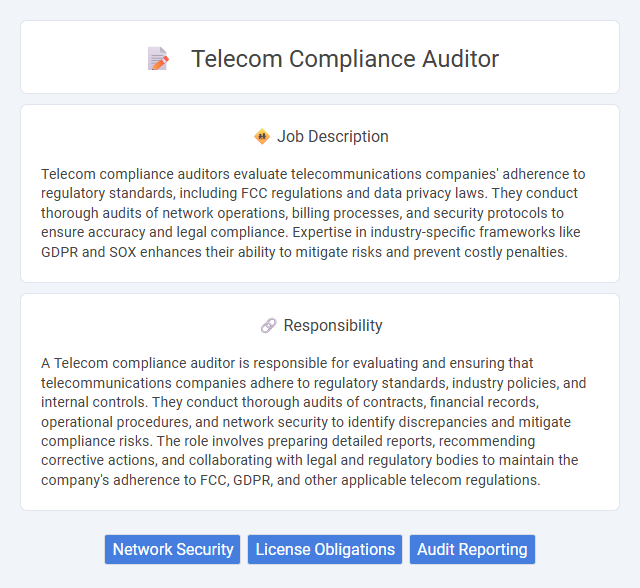
Telecom compliance auditors evaluate telecommunications companies' adherence to regulatory standards, including FCC regulations and data privacy laws. They conduct thorough audits of network operations, billing processes, and security protocols to ensure accuracy and legal compliance. Expertise in industry-specific frameworks like GDPR and SOX enhances their ability to mitigate risks and prevent costly penalties.
Individuals with strong analytical skills and attention to detail are likely to thrive as telecom compliance auditors, as the role demands thorough evaluation of regulatory adherence. Those comfortable working independently and interpreting complex telecommunications regulations may find this position particularly suitable. Candidates less inclined toward meticulous documentation or uncomfortable with regulatory environments might experience challenges in this job.
Qualification
A Telecom Compliance Auditor must possess a strong understanding of telecommunications regulations such as FCC rules, GDPR, and HIPAA, along with experience in risk assessment and internal auditing. Proficiency in audit software, data analysis, and knowledge of industry standards like ISO 27001 and COBIT enhances effectiveness in identifying compliance gaps. Certifications such as Certified Internal Auditor (CIA), Certified Information Systems Auditor (CISA), or Telecom Compliance Certification demonstrate expertise and are often required.
Responsibility
A Telecom compliance auditor is responsible for evaluating and ensuring that telecommunications companies adhere to regulatory standards, industry policies, and internal controls. They conduct thorough audits of contracts, financial records, operational procedures, and network security to identify discrepancies and mitigate compliance risks. The role involves preparing detailed reports, recommending corrective actions, and collaborating with legal and regulatory bodies to maintain the company's adherence to FCC, GDPR, and other applicable telecom regulations.
Benefit
Telecom compliance auditor roles likely offer significant benefits, including exposure to continually evolving regulatory frameworks and technology standards, which enhances professional expertise and marketability. Candidates may find rewarding career progression opportunities due to the specialized nature of telecom regulations and the critical need for risk mitigation in this sector. The position probably provides competitive compensation and a stable career path in a high-demand field focused on ensuring regulatory adherence and operational integrity.
Challenge
Telecom compliance auditor roles likely involve navigating complex regulatory environments, requiring a strong understanding of evolving industry standards and legal requirements. The challenge may stem from balancing detailed audits with rapidly changing telecom technologies and policies, which can introduce compliance uncertainties. Auditors probably need to stay vigilant and adaptable to effectively identify risks and ensure organizational adherence to both national and international regulations.
Career Advancement
Telecom compliance auditors play a critical role in ensuring regulatory adherence within telecommunications companies, opening pathways to senior compliance officer or risk management positions. Mastery of industry standards such as FCC regulations and ISO/IEC 27001 certifications enhances career mobility and salary potential. Expertise in auditing tools and data analysis supports progression into strategic roles overseeing corporate governance and operational risk mitigation.
Key Terms
Network Security
Telecom compliance auditors specializing in network security assess and ensure adherence to regulatory standards such as HIPAA, GDPR, and PCI-DSS within telecommunications infrastructures. They conduct detailed security audits, vulnerability assessments, and risk evaluations to identify potential threats and enforce compliance with industry-specific cybersecurity protocols. Proficiency in firewall configurations, intrusion detection systems, and encryption technologies is essential for maintaining secure network environments and preventing data breaches.
License Obligations
A Telecom compliance auditor ensures that all licensing obligations are strictly adhered to by verifying regulatory requirements and monitoring service provider activities. They conduct thorough audits to confirm that telecom operators maintain valid licenses, comply with spectrum usage terms, and meet reporting obligations stipulated by telecommunications authorities. Their role safeguards against penalties and supports continuous lawful operation within the telecommunications industry.
Audit Reporting
A Telecom compliance auditor specializes in evaluating regulatory adherence within telecommunications companies, producing detailed audit reports that highlight discrepancies and risks in network operations and data security. These audit reports include findings on compliance with FCC regulations, GDPR, and industry-specific standards, ensuring transparency and accountability. Effective audit reporting supports corrective actions and strategic improvements to maintain regulatory compliance and mitigate potential penalties.
 kuljobs.com
kuljobs.com